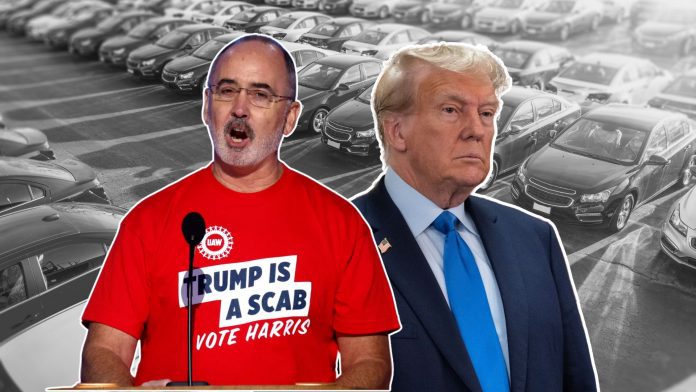Donald Trump’s victory in the 2024 election has dealt a significant blow to UAW President Shawn Fain’s efforts to rebuild the union’s political influence. Despite an aggressive campaign to support Vice President Kamala Harris, the union’s influence fell short, particularly among its members, who were divided in their political leanings. The defeat raises questions about Fain’s political sway within the membership and the effectiveness of the union’s efforts.
In the lead-up to the election, Fain spearheaded a costly and wide-reaching campaign to rally union support for Harris, contributing $1.5 million to the Democratic National Committee. The union held rallies, produced video ads, and signed up over 5,000 volunteers to engage members.
In addition, UAW workers campaigned across crucial battleground states, knocking on hundreds of thousands of doors, with a significant focus on Michigan. However, NBC News exit polls suggested that 44% of union members voted for Trump, particularly in Michigan and Pennsylvania, signaling that the union’s efforts failed to sway enough workers.
Art Wheaton, a labor relations expert at Cornell University, noted that Fain’s campaign did not achieve its intended effect. Union members were primarily concerned with job security due to the transition to electric vehicles, a concern that Trump effectively used to his advantage. Marick Masters, a labor expert at Wayne State University, stated that Fain faced significant challenges due to a divided membership and a flawed candidate in Harris. These factors ultimately influenced the election results more than the union’s efforts could have.
Fain, who aimed to energize the UAW base by employing the same tactics that resulted in successful contract negotiations with the Detroit three automakers in 2023, criticized Trump for being out of touch with workers. He framed the election as a crucial moment for labor. In contrast, Trump’s message resonated more strongly with workers worried about job security in the auto industry.
Despite the loss, Fain remains focused on the union’s broader goals. He urged members to continue fighting for better working conditions, good union jobs, and fair wages, regardless of who holds the White House.
However, under Trump’s presidency, the UAW will face additional challenges, particularly with regard to the National Labor Relations Board, which could become less favorable to union efforts.
Fain’s vocal support of Harris could also impact his future as UAW president. Some members, like Brian Keller, are calling for his removal due to the union’s political campaign and recent layoffs. Fain, who plans to seek re-election in 2026, may face increasing opposition from within the union if the political fallout continues.



